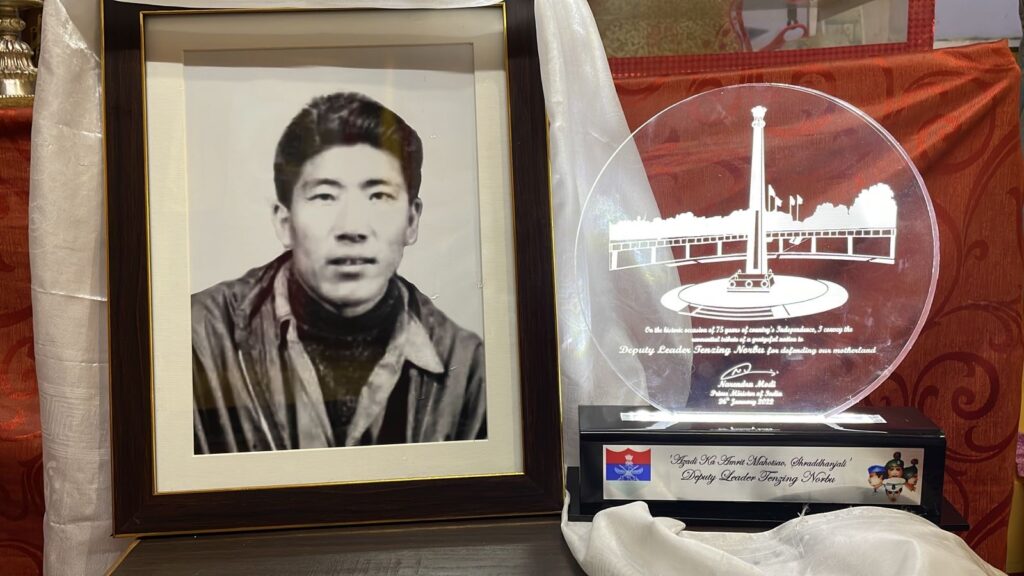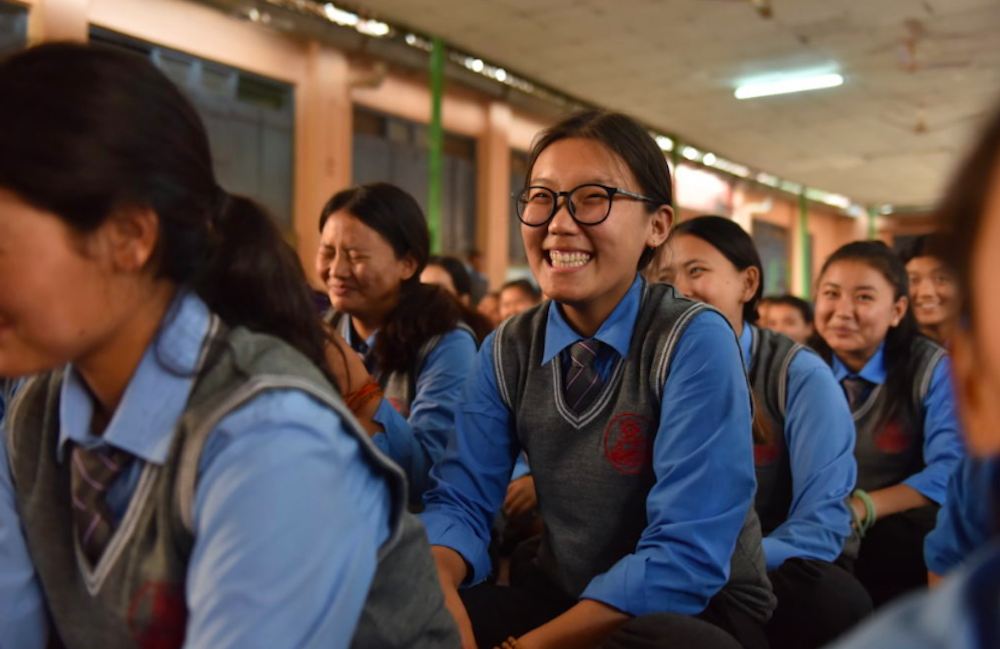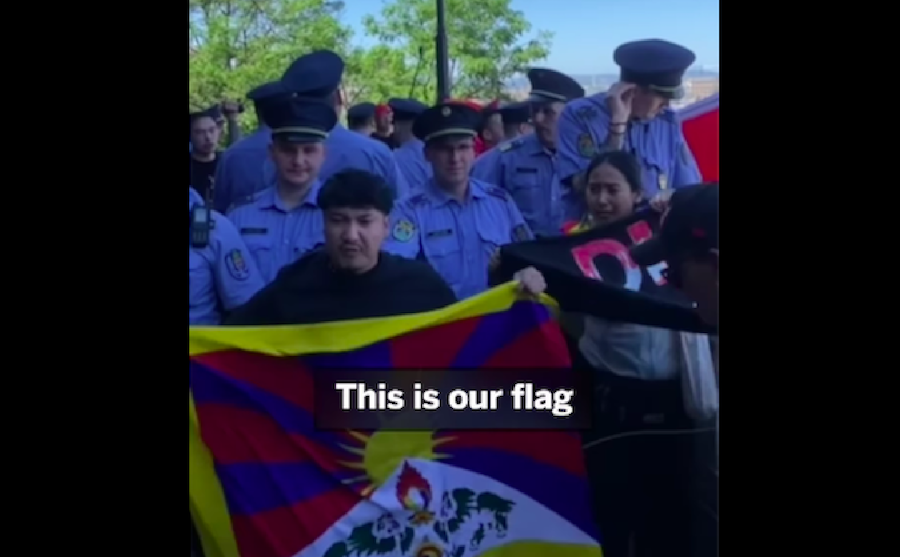By Choekyi Lhamo
DHARAMSHALA, Feb. 22: The late Special Frontier Force (SFF) Deputy leader Tenzin Norbu was posthumously honoured by Meghalaya’s BN NCC Assam regiment and awarded a memento from the government of India, signed by PM Narendra Modi, for his service. The ceremony held last week in his honour was attended by his wife Tsering Bhuti, son Tenzin Dawa and other family members. On March 22, 1988, Tenzin went missing while on duty at Siachen glacier and was believed to have lost his life in a sudden avalanche.
“It was quite difficult in the past; it has been 34 years since his death. But the government has now given tribute to a Tibetan soldier by sending Indian soldiers to commemorate the ceremony, for which I am extremely grateful,” Tsering Bhuti, wife of Norbu, told Phayul, adding that although she faced countless difficulties following his death, she is now proud that his legacy will be remembered. She told us that her deceased husband hailed from Tsang region in Tibet, and volunteered to join the army in 1969.
The SFF unit, referred to as the Vikas Battalion in the Indian army, was reported to be instrumental in preventing Chinese advances along the Line of Actual Control (LAC) in Ladakh last year. The Indian public came to know about the ’22 establishment’ only after the Galwan valley confrontation in 2020, where Tibetan soldier Tenzin Nyima was killed at the border.
The SFF leader’s son, Tenzin Dawa, said that he is relieved to see his father getting recognized after over three decades. “My father died on duty in the Siachen glaciers, and it is only now that he is being recognized for his courage. When he died, there were eight more soldiers who went missing with him; my father was the eldest among them. I was a small kid when all this happened, so I don’t exactly remember everything,” Dawa told Phayul. He pointed out that it is of utmost importance to tell the stories of SFF soldiers who have been side-lined for so long, but he also said that he felt doubly reassured that this is one of the first steps in the right direction.
One of the soldiers at the official ceremony read a short tribute to the martyr’s life, “Deputy Leader Tenzin Norbu is one such brave heart. A simple person born in the Tibetan plateau joining the Indian army in an era filled with hardship. Not only was he a brave soldier, but an exceptional leader serving in the first Vikas unit of the SFF. Tenzin Norbu was posted in Ladakh in the late 80s to control outside aggression from entering the territory of India and to neutralize any threats towards our country. . . [He] shall never be forgotten.” The Settlement Officer Pema Dhondup who was also present at the ceremony, thanked the government of India and Assam regiment for recognizing Norbu’s sacrifice at the battlefield.
The SFF or the ‘22 establishment’ is an elite paramilitary force created in 1962 consisting of Tibetan refugee recruits by India. The soldiers of SFF had participated in Operation Eagle (securing Chittagong hills during the Bangladesh War of 1971), Operation Bluestar (clearing Amritsar’s Golden Temple in 1984), Operation Meghdoot (securing the Siachen glacier in 1984) and Operation Vijay (against Pakistan at Kargil in 1999).











3 Responses
It is a noble deed by India to recognise Special Frontier Force’s (SFF) Deputy Leader Tenzin Nyima’s sacrifice after 34 years. The sudden recognition and acknowledgement might have been spurred by the Chinese Government’s attempt to glorify the Chinese soldier involved in the Galwan incident by selecting him as one of the torch bearers of the recently concluded Beijing Winter Games.
It could also be India’s acknowledgement of the services of the Special Frontier Forces in not only guarding the tense Indo-Tibet border areas but also the Indo-Pak border over the years. This is no mean task since it’s extremely cold on the Siachen glacier, lying in the Karakoram Range System of Kashmir near the India-Pakistan border. India captured 1000 square mile strategic region in 1984 during operation Meghdoot with the help of the SFF. Both India and Pakistan maintain heavy military presence in the region. Thousands have died mostly due to natural hazards such as avalanche which also killed Tenzin Nyima and his Tibetan colleagues in the region in 1988.
In winter this region is frozen and the Indian army has to bring supplies by helicopters since there is no roads owing to heavy snow. At such altitude and extreme cold, it’s the brave Tibetan soldiers who have guarded India’s frontiers for many decades. Owing to the extreme cold, the gun gets clogged with its lubricants frozen and hence, the Tibetan soldiers keep the guns between their legs to prevent such jamming.
Whether it’s Siachen, Ladakh, Sikkim or Arunachal, the extreme cold makes it difficult for people from plains to survive and fight the enemy. That is why the SFF has been the van guard of India’s national defence in the high Himalayas since it was formed on 14th November 1962.
The gallantry of the SFF is well-known after the Liberation of Bangladesh in 1971. The SFF played a crucial role in defeating the West Pakistan Forces by surprise attacks in the Chittagong Hill Tracts which earned them the epithet “the Phantoms of Chittagong”. Their guerrilla tactics badly mauled the enemy forces and by the time Indian regular forces arrived, the West Pakistani army was severely depleted and demoralised.
However, the Indian generals wanted to take the credit for themselves and never acknowledged the bravery and sacrifice of the gallant SFF. There was a political angle as well. India didn’t want the world to know about the existence of the SFF since the Chinese have always been wary of the SFF which is primarily the residual forces of the Tibetan freedom fighters during the Chinese invasion of Tibet. SFF luminaries like Dapon Ratruk Ngawang, Dapon Jampa Kalden, Dapon Gyaton Dhondup and Dapon Pekar Thinley were all from the NATIONAL VOLUNTEERS OF THE TIBETAN RESISTANT MOVEMENT known in Tibetan as བསྟན་བསྲུང་དྭངས་བླངས་དམག་མི་
Dapon Gyaton Dhondup was killed during the Bangla war along with fourty-one other SFF soldiers. The ground work for the Liberation of Bangladesh was laid by the Tibetan SFF fighters. Despite their sacrifice and contribution, not only their valour was not acknowledged but the SFF troops were not even allowed to to parade in Chittagong after the victory!
The acknowledgement of the sacrifice of Deputy Leader Tenzin Nyima is most welcome and it is hoped that all the other members of the SFF soldiers who lost their life on active duty along with him are also acknowledged in the same way. Such gestures will boost the morale of those who are serving and will give incentive for those who might like to join the SFF in future.
Very heart warming, sad and proud story of sacrifice.
And I thank on behalf of my family to the Govt.of India ,SSF,and especially our Prime Minister Sir Narendra Modi Ji for letting us know that we are not forgotten in the form of an HONOUR that we received.. I m a proud son and I m a proud Tibetan.JAI HIND JAI TIBET.